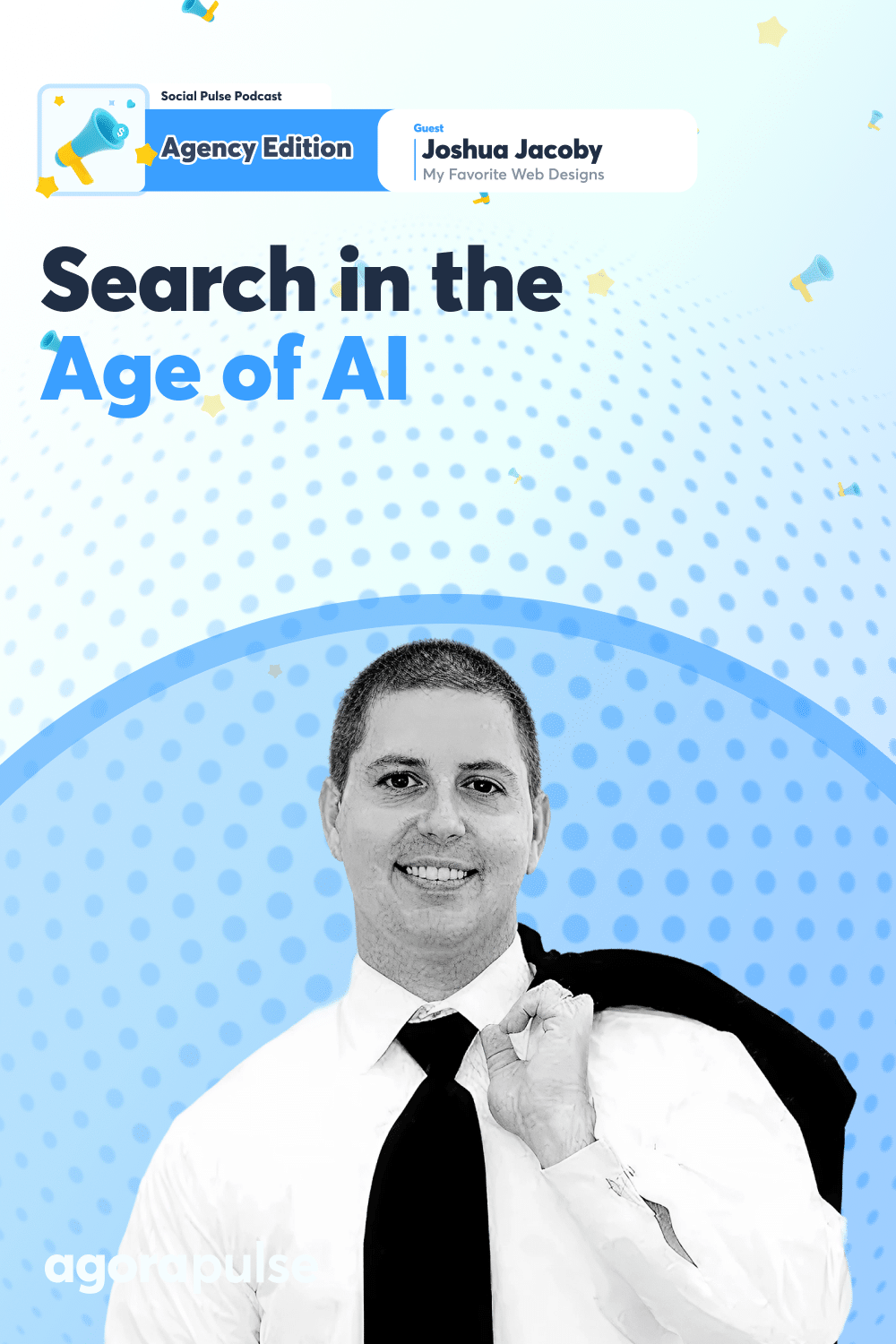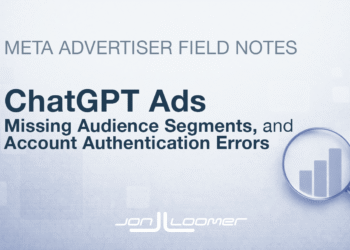AI has fundamentally altered how search engines evaluate and rank websites. Many agency owners feel like they’re playing a game where the rules keep changing without notice, risking client retention and struggling to articulate their value proposition in this new landscape.
Today’s Social Pulse: Agency Edition, powered by Agorapulse, guest Joshua Jacoby owns My Favorite Web Designs, a Mesa-based digital marketing agency that’s successfully guided over 200 local clients through evolving search landscapes. His expertise in SEO web design, combined with his ability in crisis, positions him perfectly to help us navigate the AI revolution reshaping search.
[Listen to the full episode below, or get the highlights of the Social Pulse: Agency Edition, powered by Agorapulse. Try it for free today.]
Could you share just how you’ve seen AI impact search just in the past 12 to 18 months, and what shift do you think is most concerning for agency owners?
Joshua Jacoby: Yeah, the advent of AI has been fascinating for us, I’m sure, as well as many of the people with whom you interact.
First, let me say that we do have clients gaining clients from AI searches. A year and a half ago, that was in the realm of speculation, but now every month our bigger clients catch some people off, whether it’s ChatGPT or Perplexity or even Gemini, more and more actual conversion is happening in terms of artificial intelligence.
It has also been incredibly challenging in some ways because, of course, it has an entirely different algorithm than traditional search but that being said, a lot of what’s worked in traditional search also influences that AI algorithm, for instance, building your SEAT (Expertise, Authority and Trustworthiness) will also help you with the AI algorithm so as much as things are changing, they’re also staying similar and we’re navigating as best we can day by day.
What website design elements now do you think matter most in an AI-powered search environment?
Joshua Jacoby: Yeah, definitely your proof of credibility, so your trust builders, if you have a 5.0 on Google, implementing that into your website is a clear signal to the AI that it appreciates.
A lot of AI gets touted as being unknowable and mysterious in some ways, and there is a mysterious aspect to it, but it’s also very simple.
So, if you imagine the kind of things you might look for, if somebody tasked you with finding the best SEO agency on the internet. One of the things might be how well reviewed this person is. What agencies are they a part of? What certifications do they have? And those things are still very pertinent, so adding your certifications and your trust builders to your website is very important.
I mean, there are other parts of it, so managing your reputation across your social and across your maps and so forth also plays a part in how you influence that artificial intelligence.
So, all those things build into the AI ecosystem.
How are you approaching the content side of things for clients now that AI has changed how search engines evaluate website quality?
Joshua Jacoby: Yeah, so that’s a very interesting one.
Every year, ranking factors kind of change in terms of what has the strongest influence on your local ranking and on your organic ranking.
This year, we’re continuing to see strong results from guest posts, hyper-local guest posts, so close to the business that you’re representing, and guest posts that are niche specific, so if you’re representing a lawyer and then you guest post with a lawyer, that’s of course very apropos and that can help.
But all the guest blog exchanges that we try to do almost always get hit with AI content so if we approach another business and we ask them to write an article and then we’re writing an article, one of the things we have to look out for is whether they’ve generated that article entirely with AI content.
And there are a couple of different tools that you can use to detect if the content that you’re receiving is AI-generated. Typically, we use three or four different tools. One of them is the ChatGPT detector, and another one is QuillBot.
We have a few others, and I do recommend that you do the AI detection on a couple of different systems because you can get false positives and also false negatives, so we go with what is said three times might be true. But it’s been very interesting on the guest blogging because every single article, like I would say, outta 20 different exchanges over the last six months, every single one that was sent our way was 100% AI generated, and we were under the impression that Google was okay with AI generated content because they did come out with a blog post about seven months ago.
Saying that if your content is improved through the use of artificial intelligence, then that’s okay, and you’re creating a better user experience, and therefore it’s a quality piece of content, but that’s not the reality.
And they came out with a qualifying guideline about a month ago when they released new guidelines for their quality raters, and they have then detecting whether or not the content that they’re evaluating is entirely AI-generated and if it is, then they have to market downwards in terms of quality because it’s not unique and that is existential so that means that every piece of content we get through our agency has to be reversed to make sure that it’s not AI generated and all the guest blog exchanges also have to be reversed, and we’re ending up rewriting stuff left and right.
Mike Allton: Wow, that is informative.
I hadn’t heard that level of detail before. I’ve certainly heard that, conversationally, anecdotally, try to steer away from a hundred percent AI-generated content, which made a lot of sense, but I think most people were talking about from a user authenticity, that sort of thing, perspective, necessarily from an SEO perspective, so that’s fascinating.
You also mentioned, obviously, guest blogging, and I was doing research just recently and the research was agreeing with you and also talking about things like, if you wanted to be a come up for a best of whatever your business is, then it would behove you to be listed amongst other kinds of brands in reputable sites.
And what that all is telling me, it feels like there’s a shift towards external, extra-site kinds of content and listings more than within your site.
Does it feel that way to you, too?
Joshua Jacoby: It does. In terms of the content that we create, that seems to get picked up by this AI algorithm, one of the places that we found a lot of productivity is in what we call Third Tier Review Sites.
So for the first tier, we’re usually identifying Google My Business and Facebook, because Facebook is going over Bing, so those are your tier ones. Your tier twos are the things that are a little harder to fake, that might be your Yelp, some of your other social media, things like that.
And your tier three is the places where you probably have never focused on collecting reviews, like perhaps your Yellow Pages or your Manta, or your HotFrog, or just some random sites like that, but the AI does crawl those things and correlate them back to your entity. And we found very interesting results for Google Maps in populating reviews onto those third-tier sites.
But even more importantly, we’re seeing them getting picked up by the AI, and then the AI is saying, Oh, the best is this person based on their review velocity over the last few months.
Third-party sites have a big bearing on it, and I’m sure you’ve experienced this, Mike. The social proof that we bring to the table is also very important to this AI algorithm and to the future of search, so both of those are slightly different focuses than we had in the years prior.
Are there any other misconceptions that you’re seeing agency owners have about AI and search?
Joshua Jacoby: Definitely, a lot of people are using AI writing ’cause I feel like they may not overly understand the negative impact of AI writing, ’cause Google hasn’t been overly clear about it.
Here’s a good example that we did recently.
We had two big clients in very competitive spaces, some of the most competitive, possibly imaginable: personal injury in big cities. And for one of the clients, we went through their products and services, which had been written almost four years ago by another agency before we came in, and we detected that those services were entirely AI-generated in terms of the text that was used there. And just by swapping those out, we ended up with a four-position bump on Google Maps.
Can I say that it was revising the service language to take out the AI content? I cannot, but it is quite possible. So in terms of misconceptions, I think there are a lot of agencies out there who think that they can use AI for some of the simpler things, and either they won’t get caught or it won’t matter, but we’re seeing that the uniqueness is playing a role.
I’m wondering if you’ve run into any situations where you’ve had to completely rethink an entire website strategy because of this AI’s impact on search.
Joshua Jacoby: We have, so when ChatGPT had its big moment, I want to say maybe 18 months ago, we had several clients who said, you know what, this ChatGPT is writing things so well, it’s better than we can write, which in many cases is, It seems true. So they said, let’s create brand new websites and we’ll populate it 100% with AI content and we can even write scripts so that we have the AI generate the content, and then auto post to a blog, grabs an image, and so forth so that you have auto blogging going, never been my favorite.
We did try it out for two clients with two completely brand-new sites, so we’re not affecting their main brand to see how it did. And those sites went nowhere; they fell on their faces so hard. So very interesting, the limitations of AI as well as the potential benefits. Now that being said, we still love using AI. It’s just more for overviews or additional ideas for things, for helping us think up additional FAQs, but anytime we lean on it too hard, we can get in trouble.
The last thing I’ll add to that though is image generation has come into its own in the last 30 days here, so that’s still something we’re experimenting with and all indications are that Google should love AI generated images, but that remains to be seen and we’re keeping a close eye on it.
Mike Allton: Yeah, that was going to be one of my follow-up questions first, how are you using AI? It sounds like you’re using it for brainstorming, maybe outlining that sort of thing, but not the actual content creation.
And I would agree, I would imagine that images and even video, soon you’d be able to use that to augment websites well, ’cause it’s going to be a hundred percent unique in theory, cause I’ve been telling businesses, I think it’s exciting that we can generate images and we don’t have to pay for stock photography anymore.
Joshua Jacoby: Agreed, and we know Google is doing image recognition. If we’re doing an article about hammers and I have a photo of a hammer on it, I’m getting more points, ’cause Google can recognize the hammer. Similarly, if you’re doing a car collision or a plumbing repair and you’re able to generate the perfect image for it, that should improve your SEO results but you know a lot of these images are watermarked and a lot of people don’t realize that, but like your images that you get off of OpenAI have a watermark on them, so it also remains to be seen whether that’s considered less unique and therefore lesser of a quality but we will find out.
Is AI changing local search at all?
Joshua Jacoby: It is, of course, AI is picking winners and losers in terms of its algorithm, but in terms of how we future-proof locals, a lot of it has to do with how we believe that businesses are going to interact with AI in the future.
For instance, things like an online booking tool are more important than ever because if you envision how an AI might interact with your business to book something for its client, it’s going to want to be able to book online rather than make a phone call, and there has been experimentation with having AI do phone calls and book, through a verbal route but as you can imagine, if they can do these things 100% through your website. That’s a huge advantage for whatever tool you’re employing.
AI also has a lot to do with the verification of reviews. So, for instance, Google released on their blog recently an article about how they’re using AI detection to stamp out fake reviews. And we’ve seen some of that, and that’s been beneficial to us because we don’t do fake reviews, so our clients weren’t negatively impacted, and we did jump a few positions and saw a couple of hundred reviews knocked off the competitors in different places.
And we’re excited for more of that because if you use an AI detection algorithm to stamp out the fraud, then you have a much more level playing field where the best actors are going to be the ones that stand out instead of the people using Black hat techniques.
Are there any specific metrics that agencies should be tracking differently that would demonstrate value to clients?
Joshua Jacoby: That is one of the more important things. It’s very interesting how analytics has been co-opted by AI. For instance, most people who run websites that have large content footprints and are drawing a lot of traffic organically have seen a reduction in the traffic that they’re drawing organically because of AI overviews.
And that’s not always indicative of a lower conversion or a lower value for the brand. It’s just worth understanding that, if it’s informational, especially, it’s probably getting answered by an overview and then not needing a visit to your website.
In terms of the metrics that we track for our clients, we still do traditional rank reporting manually on just a few keywords, so that we have a rule of thumb, and we now do that rank reporting across the AI system, so we do Perplexity, Open AI, and Gemini predominantly but there’s more and more coming every day that we also need to do ranks for.
And I’d say those are the main metrics that we’re focused on right now. We’re interested to see more analytics coming out of those tools specifically, but it’s all forming right now.
Joshua Jacoby: We have used many different rank trackers over the years.
We’ve used Moz, SemRush, we’ve used BrightLocal especially for local results, which has been nice, but we do like to have a few keywords that we do manually for an old school rank report because some of the rankings that come through, those tools get skewed, and we believe that Google may be purposely skewing some of those tools at this point.
Learn agency tips, tricks, and insights from all our podcast guests in every episode of Social Pulse: Agency Edition.
For instance, there was a change about a month and a half ago where if a crawler didn’t have JavaScript enabled, Google was skewing the results or not serving the results altogether, and that was almost definitely aimed at a lot of the rank tools to keep them from engaging so much with the search and using up their bandwidth if we had to guess.
So yeah, some traditional old school rank reporting is also very good. We know other agencies that try to do that with fifty or a hundred keywords; we just put those into the automated systems if we want to do a big rank report. But a good rule of thumb with five to ten core important keywords is awesome to be able to do, and of course, we check those on mobile and desktop.
Are there any resources like blog posts, podcasts, anything like that you recommend to others?
Joshua Jacoby: So the Google Blog is fantastic, user-generated content is better than it’s ever been, so I love the GMB SubReddit, I love the local search subreddit. I love the paid Ads search on Reddit. One thing I didn’t bring up was some of the impact that we’ve seen on Google Ads, and this is something I’ve been dealing with this week, so I’ll just throw that out there.
AI, as much as it’s powering improvements in marketing, is also powering improvements in spam. So, a lot of the spam detection tools use things like click patterns and click behavior, average time on pages, and the way that you’re interacting with the site to determine if a user’s actually spam.
And we’re seeing more and more spam users using AI to circumvent those prevention features, and that negatively impacts Google AdWords almost more than anything we’ve seen, so there are tools that you can put on top of Google AdWords, such as Click Cease and Traffic Guard and there’s also spam prevention you can do through things like a managed challenge with CloudFlare, but I do think that staying on top of your AI spam is going to be a big part of the marketing future because it has been massive this year and most of the places that we get good tips on that is from the Reddit User Generated Content, Web Tribe, The Moz Blog, The Search Engine Land Blog, and several others and there’s good articles there.
The only thing I’ll say about the articles is that they tend to be written by experts, and there’s nothing wrong with that, but the best advice I love to get is from people who are struggling in the trenches and failing, but then finding success afterwards. So Reddit, surprisingly, has become a hotbed for those types of experiences.
Thank you for reading the recap highlights from this episode of Social Pulse: Agency Edition, powered by Agorapulse. Try it for FREE today!
And don’t miss other editions of the Social Pulse Podcast, like the Retail, Hospitality, and B2B editions.



![How to create a social media report [free template included]](https://mgrowtech.com/wp-content/uploads/2026/01/social-media-report-350x250.png)












